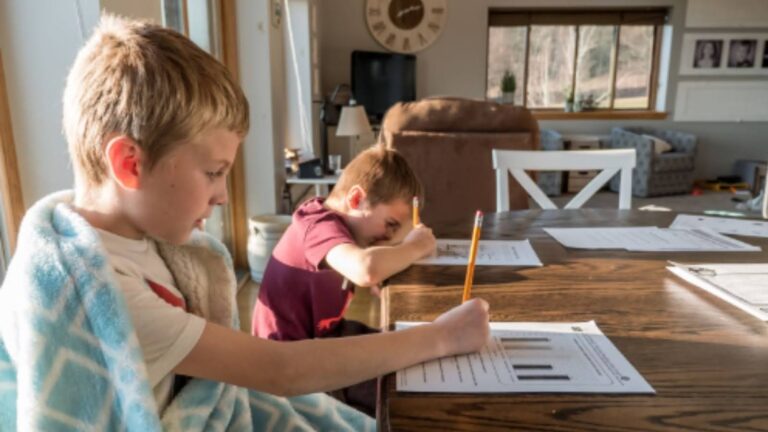Right now, many parents are considering homeschooling for their kids. What is homeschooling, you may ask? It’s when children are educated at home by their parents or tutors instead of attending a traditional public or private school. We know that this educational method is not all about the privilege of having your child in pajamas until noon (although, let’s face it, that’s a major bonus). It’s a full-on educational path that many people are drawn to for many reasons. In this article, Abbie Kay of StateofWriting shares a great list of five positives and negatives when homeschooling your kid.
Pros of Homeschooling
-
Customized Learning Experience
A quote by a famous author Vince Gowman says: “The best education does not happen at a desk, but rather engaged in everyday living – hands-on, exploring, in an active relationship with life”, and that’s exactly what homeschooling is all about. Every child learns differently – they will have different strengths and weaknesses, learn at different speeds, and have different ways of approaching educational content. Having mentioned the latter, if your student ever needs help with homework that is beyond your parental capabilities, you can hire Stateofwriting to do your homework. They have educational experts who work in various niches and will easily offer help with any subject or project.
The ability to customize learning schedule to the specific needs of a child and their family is one of the reasons homeschooling has grown in popularity over the recent years, as highlighted by this chart:
Source: National Home Education Research Institute
-
Flexible Schedule
Goodbye, school bell tyranny! With homeschooling, you have full control over the scheduling. If you travel frequently or want your kid to learn at a convenient time, you can easily make it happen.
-
Safe Learning Environment
As bullying and school safety become a central concern, homeschooling becomes a protective and safe environment for children to learn and develop free of peer pressure.

-
Stronger Family Bonds
Want your kid to spend more time with the family? Homeschooling makes it easy. Family bonds usually become closer as parents participate in their children’s learning journey every day.
-
Focus on Life Skills
Contrary to what critics might believe, homeschooling isn’t all about book learning. Kids can also learn various life skills, which will prepare them for the challenging real world.
Here are just a few skills homeschooled kids learn:
| Skill | Description |
| Time Management | Homeschooling teaches kids to organize their day and manage their time effectively, as they often have to balance different subjects on their own. |
| Self-Discipline | Without a strict school schedule, homeschooled children learn to motivate themselves to complete tasks and study. |
| Independent Learning | Children learn how to seek out information, ask questions, and learn independently, skills that are valuable throughout life. |
| Critical Thinking | Homeschooling often involves exploring subjects more deeply than in traditional settings, helping children develop the ability to think critically and solve problems. |
| Adaptability | Moving at their own pace and sometimes in different environments, homeschooled children learn to adapt to various situations and challenges. |
Cons of Homeschooling
-
Intense Time Commitment
Parents who work full-time will find homeschooling difficult. It can be a 24-hour job. Not only do you need to determine when to start homeschooling, you also need to plan lessons, but you also need to deliver them and grade them. For many parents, that sounds like a full-time job.
-
Limited Socialization
The primary knock against homeschooling is the absence of social interaction. Though there are ways to mitigate this via afterschool activities and homeschool groups, you would have to be proactive about it.
-
Resource Constraints
While schoolchildren have access to labs, gymnasiums, and art studios, homeschooled students often do not, and parents sometimes have to be more inventive, not to mention spend more money on those resources.
-
Academic Pressure
It can be difficult to know where that teacher-and-learner boundary lies when the same parent performs both roles.

-
Questioning from Outsiders
If you choose to homeschool your kid, you will likely face many opinions from parents, teachers, and anyone else who thinks they know better. There’s no going around it; you must grow tougher skin.
Finding What Works for You
As with any familial choice, deciding whether to homeschool your children is fraught with complications and compromises – not to mention the residual judgments from others outside and within your community. Homeschooling isn’t for everyone: for those who pull the trigger and stick with it, it offers an intensely personal and potentially rewarding educational option. Does it fit the purpose of your family’s lifestyle, values, and educational priorities? Only time and careful reflection will tell. But we hope Abbie Kay’s insights have offered you something to chew on if you’re seriously considering homeschooling. Ultimately, it all boils down to how you weigh those pros against cons in the context of your own family.

